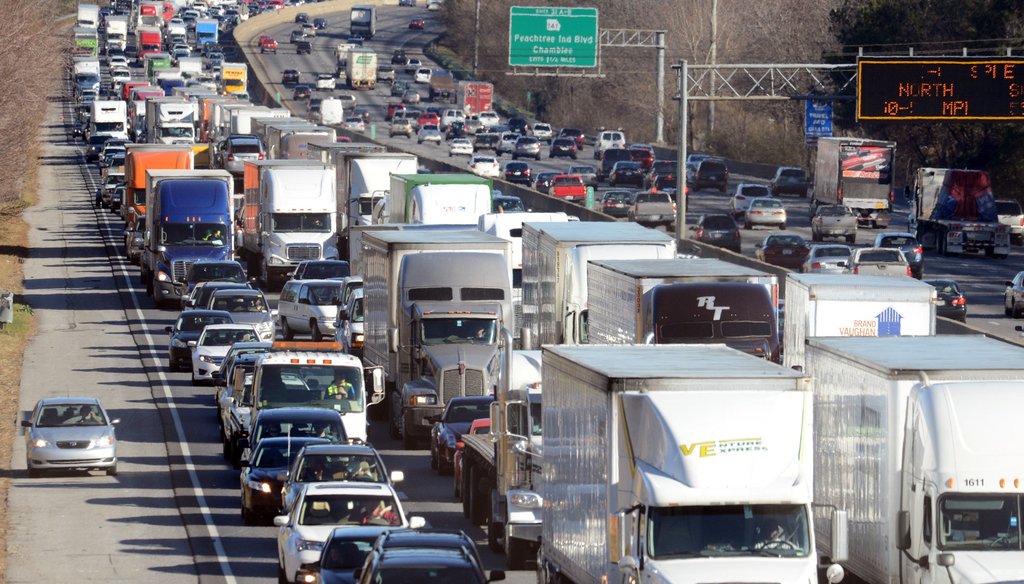Stand up for the facts!
Our only agenda is to publish the truth so you can be an informed participant in democracy.
We need your help.
I would like to contribute

Traffic snarls on I-285 westbound due to a midday accident. Photo by Kent D. Johnson / AJC
State lawmakers have agreed about one thing: The future of Georgia literally rides on transportation reform here.
How exactly to address the gridlock, paltry transit options and backlog of work is supposed to be decided in House Bill 170, a proposal to produce up to $1 billion a year for projects.
That measure is idling in the House Transportation Committee, as lawmakers struggle to craft a bill that can win approval yet also raise enough cash to provide serious maintenance of Georgia roads and bridges.
In the meantime, PolitiFact Georgia has checked several claims and statistics surrounding the debate:
A DECLINE OF FEDERAL DOLLARS
Georgia is weighing how to step up and generate more money for transportation at a time when the federal government’s share of that money is dropping.
An Associated Press report analyzed Federal Highway Trust Funding and found Georgia’s share of that cash dropped 12 percent between 2008 and 2013.
PolitiFact Georgia checked the figures and found we received $8.14 billion from the trust fund in that period. But the annual figures declined from $1.44 billion in 2008 to $1.27 billion in 2013.
By our calculations, that’s 12 percent. We rated the AP report True.
LIMITED COMMUTING OPTIONS
The Atlanta Regional Commission and St. Vincent de Paul Society sponsored a forum on transportation in January, just as lawmakers were settling in for session.
Author Rebecca Burns served as keynote of the Building Opportunity event and cited Brookings Institution data to drive home transportation challenges in Georgia’s capital city.
MARTA General Manager Keith Parker posted a Tweet that captured her presentation: "18 percent of jobs are accessible by transit for metro Atlanta residents, 33 percent for those living in the city."
Review of the 2011 report, "Missed Opportunity: Transit and Jobs in Metropolitan America, " found that the Atlanta-Sandy Springs-Marietta metro area was among the worst in the nation for residents trying to reach work via transit.
The study, the most recent available, found that 33 percent of the Atlanta region's jobs are accessible for city residents by public transportation and just 17 percent for suburbanites.
Atlanta ranked 91st out of the 100 largest metro areas studied nationwide.
The presentation numbers were off, but just barely. And the point remains.
We rated Parker's claim True.
A LOOK AT CURRENT GAS TAXES
Before the session began, the panel charged with recommending how to tackle transportation funding repeatedly discussed one of challenges that remains to action: Raising taxes.
Lawmakers have talked for years about raising the rates of either Georgia’s 4 percent sales tax on gasoline or the 7.5-cents-per-gallon excise tax on gas, but always lacked the political will.
Former state Rep. Edward Lindsey emphasized the need to fiddle with those taxes, noting that Georgia has some of the highest gas taxes in the region but among the lowest for transportation in the country.
The first part is on target. Georgians pay 19.3 cents per gallon of gasoline to the state as of January. Only 14 states had lower rates, including our neighbors Alabama, Florida and South Carolina.
Where it gets tricky is when local taxes are added into the total. Some states, such as Florida, levy most of their taxes on the local level --- driving up overall prices at the pump.
Georgia, meanwhile, allows every county to levy sales taxes on gas that don't have to go toward transportation costs. Those local taxes drive up the average so that Georgia has the third-highest gas taxes in the region.
One caveat: The ranking is a distant third. Georgia could double its state excise tax and still remain in third place.
Still, overall Lindsey is right looking at the rankings alone.
We rated his statement Mostly True.
Our Sources
See individual reports.






















































